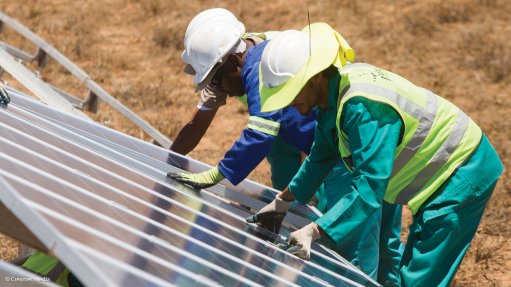Telkom 'not broken', but needs 'urgent' turnaround, says new CEO
Sipho Maseko, who took over as the CEO of embattled telecommunications group Telkom on April 1, said on Friday that the JSE-listed group required an “urgent” turnaround, but stressed that the firm was “not broken” and reassured shareholders that the mistakes of the past would not be repeated.
“We have had a rough time these past few years, and now we need to reset who we are as Telkom,” he said at a financial year-end results presentation, in Johannesburg, where Telkom reported a R11.7-billion loss.
Telkom had been challenged with declining revenue, a high cost structure, damaged reputation, difficult relationships with government an unfavourable regulatory environment, a weak mobile position, customer service issues and brand perception difficulties.
Maseko said that Telkom had not had "sparkling financial results" during the past years and had been registering a revenue decline of about 2% a year. Telkom’s shares had also been trading below book value for the past five to six years.
Telkom reported a 73.2% decline in headline earnings for the year ended March to 87c. The headline earnings were not impacted by the group’s R12-billion impairment of its legacy network, which contributed to the basic loss a share of R22.76, down from a basic loss of 42.3c a share.
“Success will require a complete transformation of the group … but it will take time,” he stated.
Maseko noted that a combination of performance improvement and strategic planning would help deliver improved financial results.
He said that focus would narrow to maximising the firm’s next-generation network efficiencies, ensuring better management of third-party spend; improving customer service effectiveness; integration and innovation, and optimising human resources and capacity building.
Further strategic focus areas would include considering possible wholesale, retail, mobile and consumers options and developing effective management of regulatory and policy framework.
Telkom would also move to participate in the national broadband plan; however, while Telkom had a significant role to play in government’s broadband ambitions, the firm and government had two separate strategies and Telkom would pursue the strategy that was in the best interests of the company and stakeholders, Maseko stressed.
Telkom was currently undertaking a full strategic review, focusing on short and medium-term interventions to unlock value.
“Tough decisions will have to be made, particularly regarding costs and the decommissioning of unprofitable services,” Maseko commented.
Telkom’s new head of strategy, Dr Miriam Altman, would lead the strategic review.
Maseko, who was appointed to head up the firm after Nombulelo Moholi resigned, believed that Telkom had the ability and infrastructure to “redefine the future of telecommunications” in South Africa.
"Despite the current financial performance, there is significant opportunity for Telkom to build a profitable and sustainable business that is able to support South Africa's economic development.”
Telkom’s significant assets comprised 80% of the total fibre in South Africa, spanning 147 000 km and linking South Africa to 70 countries and 700 cities.
The group, which funded its network upgrades through cash from operations, would continue to inject over R5-billion a year.
During 2013, Telkom ramped up investments, pouring R5.7-billion into network upgrades, up from the R4.7-billion spent during 2012.
Over R2-billion was spent on deploying technologies to support the growing data services business, links to the mobile cellular operators and expenditure for access line deployment in selected high-growth commercial and business areas.
Expenditure on network evolution reached R1.2-billion and R310-million was spent on replacing obsolete power systems, as well as the replacement and modernisation of the access and core network.
Telkom had been heavily exposed to fixed-line structures, as mobile uptake worldwide accelerated. The group reported a 4.9% decline to 3.8-million fixed lines, a 1.4% fall in revenue for each fixed line and 6.1% decrease in the number of employees for each fixed line, from 191 employees a line in 2012, to 179 in 2013.
However, the group aimed to leverage its fixed-line assets into offering converged services and stable, reliable fixed data offerings.
The significant upgrades undertaken over the past year would yield speeds of up to 40 Mb/s and enable “true converged” offerings.
The firm had integrated 651 long-term evolution sites, integrated 1 985 mobile sites and constructed 2 299 mobile base stations during the year ended 2013.
The firm also added 5.2% more ADSL subscribers.
“It's not a bad place to be a fixed-line player, as long as you make the right decisions,” he said.
Maseko reaffirmed Telkom’s renewed effort in rebuilding relationships of trust with shareholders and government and being "as transparent as possible”.
Comments
Press Office
Announcements
What's On
Subscribe to improve your user experience...
Option 1 (equivalent of R125 a month):
Receive a weekly copy of Creamer Media's Engineering News & Mining Weekly magazine
(print copy for those in South Africa and e-magazine for those outside of South Africa)
Receive daily email newsletters
Access to full search results
Access archive of magazine back copies
Access to Projects in Progress
Access to ONE Research Report of your choice in PDF format
Option 2 (equivalent of R375 a month):
All benefits from Option 1
PLUS
Access to Creamer Media's Research Channel Africa for ALL Research Reports, in PDF format, on various industrial and mining sectors
including Electricity; Water; Energy Transition; Hydrogen; Roads, Rail and Ports; Coal; Gold; Platinum; Battery Metals; etc.
Already a subscriber?
Forgotten your password?
Receive weekly copy of Creamer Media's Engineering News & Mining Weekly magazine (print copy for those in South Africa and e-magazine for those outside of South Africa)
➕
Recieve daily email newsletters
➕
Access to full search results
➕
Access archive of magazine back copies
➕
Access to Projects in Progress
➕
Access to ONE Research Report of your choice in PDF format
RESEARCH CHANNEL AFRICA
R4500 (equivalent of R375 a month)
SUBSCRIBEAll benefits from Option 1
➕
Access to Creamer Media's Research Channel Africa for ALL Research Reports on various industrial and mining sectors, in PDF format, including on:
Electricity
➕
Water
➕
Energy Transition
➕
Hydrogen
➕
Roads, Rail and Ports
➕
Coal
➕
Gold
➕
Platinum
➕
Battery Metals
➕
etc.
Receive all benefits from Option 1 or Option 2 delivered to numerous people at your company
➕
Multiple User names and Passwords for simultaneous log-ins
➕
Intranet integration access to all in your organisation





















